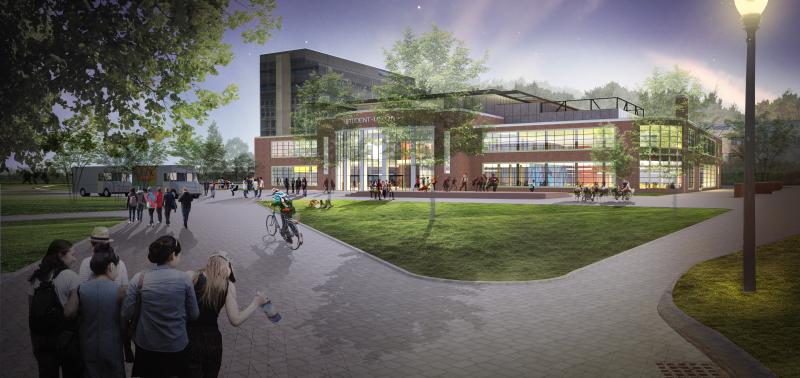UMass Amherst Decarbonization Collaboration Wins “Leading by Example” Award from Massachusetts Department of Energy Resources

Rendering of renovated Student Union building at UMass Amherst. The building has LEED Silver certification and 75% of construction waste was diverted from landfills. Photo: umass.edu
Source: UMass News and Media
A collaboration between UMass Amherst, UMass Dartmouth, UMass Lowell, and Salem State University to work together to decarbonize each campus has been recognized by the Massachusetts Department of Energy Resources with a “Leading By Example” (LBE) Award. The award was presented to representatives from each campus at a ceremony on December 9.
The LBE Awards recognize Commonwealth agencies, public colleges and universities and municipalities, as well as public sector staff or volunteers, for outstanding efforts related to clean energy and the environment that have resulted in measurable impacts.
The four-campus collaboration began during fiscal year 2020-21, when all four campuses decided to undertake a collaborative strategic planning process to decarbonize their campuses. Representatives from each campus held a series of meetings to allow for a free exchange of ideas, challenges, and lessons learned so that others might get a better result. The group kept various state agencies abreast of their discussions and how the work may affect formulating new policy. The group is also committed to sharing their information with similar institutions and agencies across the commonwealth.
The UMass Amherst Carbon Mitigation Task Force is co-chaired by Ezra Small, sustainability manager for the UMass Amherst physical plant; and Dwayne Breger, who directs the Clean Energy Extension and is a professor of environmental conservation, School of Earth and Sustainability.
“I can’t think of a more important task than to develop a plan that transitions our campus energy system to 100% renewables and zero carbon emissions within the next 10 to 15 years, and I am grateful to have co-chaired the Carbon Mitigation Taskforce for UMass Amherst along with Dwayne Breger,” said Small. “I’m happy to have traded notes and shared best practices with my colleagues at the other awarded institutions to help each other along the way, and I think we are all at the forefront of the most crucial issue of our time of addressing climate change.”
To qualify for the award, the campuses had to meet various criteria including sustainable practices, environmental benefits, cost savings, and education and outreach efforts. The UMass Amherst contributions to the award-winning proposal include:
- Reducing campus-wide emissions from 2004 to 2019 by 25% through energy conservation measures and fuel switching.
- Formulating a Carbon Mitigation Plan (CMP) during 2020 to meet a challenge issued by Chancellor Kumble Subbaswamy to explore what it would take to be 100% renewable energy and zero-carbon by 2032. Work by a task force of students, faculty, and staff showed the steps and funding that would be necessary to pursue this target. The campus will use the CMP to help inform future capital planning decisions.
- Adopting geothermal (ground source heating) and battery storage technologies. UMass Amherst now has three buildings using ground source heating, including the UMass Police Station, Crotty Hall, and the International Programs Office (IPO) building on Butterfield Terrace. Two of the buildings — the police station and Crotty Hall — are new buildings, and the IPO building was an energy system retrofit. UMass Amherst also has one battery storage system in place at the Central Heating Plant and another that will be solely charged by solar canopy generation in parking lots 21 and 22, which will come online soon.
- Launching a “Make Zero Your Hero” waste disposal campaign that helped inform students of the need to reduce waste and contamination of recyclables to zero by educating them on what waste items go into the correct bins on campus.
- Establishing a Carbon Mitigation Taskforce to formulate a Carbon Mitigation Plan. In 18 months, the taskforce made key decisions including hiring an external consultant team, student involvement, stakeholder engagement with peer institutions and other agencies, and reporting the findings to campus leadership. The next phase will move the plan toward implementation and academic integration.
- Procuring solar energy through the UMass system-wide net excess generation credit sales agreement. In fiscal 2020, UMass Amherst partnered with three projects totaling a capacity of 5 megawatts and around 6 million kilowatt-hours in net-metering generation and $560,000 in net-metering credit.
- Renovating the Student Union Building, which is anticipating a LEED Silver certification. The $62 million renovation revitalized the 1950s-era facility into a modern hub for student activity and interaction. The project diverted more than 75% of construction waste from landfills and improved air ventilation and energy efficiency.
- Investing $15 million in energy reduction work on campus that has resulted in approximately a $10 million a year savings in energy costs. The result of this work has reduced energy usage on campus by about 25% since 2010 while adding more than three million square feet of new building on campus.
- Continuing a partnership with Valley Bike Share, an e-assist bike sharing project, which is now in its fourth season operating on campus. Since partnering with Valley Bike, UMass community members have done more than 240,000 rides covering more than 585,000 miles, the equivalent of removing 210 passenger vehicles from the roads per year.
More information on UMass Amherst’s sustainability efforts can be found at https://www.umass.edu/sustainability/.
